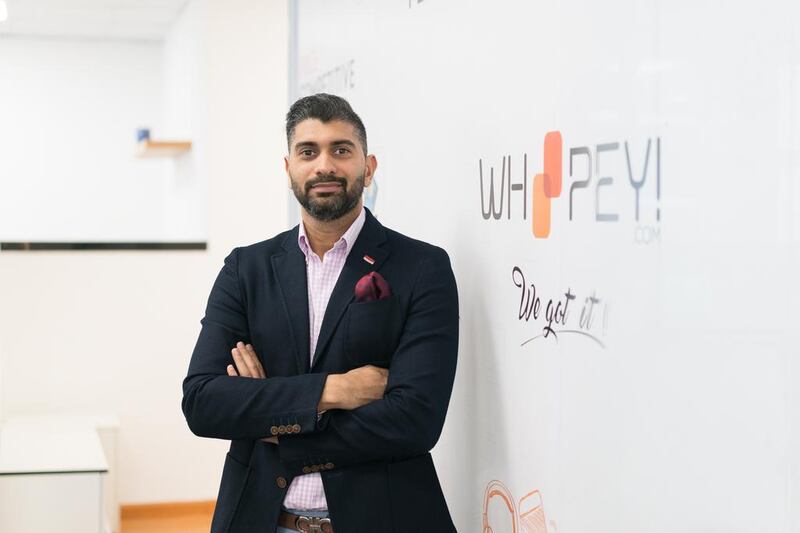Neelam Keswani, the managing director of the Dubai-based online beauty and fashion store Glamazle.com, recalls the first time she ever bought anything on the internet.
It was a package of books by the American writer Sidney Sheldon, back in 2005, which were not available in the UAE at the time. “There weren’t enough bookstores here back then. I had to get my friend to buy the books and ship them to his house in the US, and then he sent them to me via post,” says Ms Keswani.
The e-commerce landscape has changed considerably since then. The GCC was in the global top five for purchases via mobile devices last year, with a 43 per cent share of digital transactions, according to Criteo, a targeted digital advertising company. The global average is almost four in 10.
While in the past UAE consumers searched online for items that were not stocked in stores here, today anything and everything can be purchased on the web – and delivered fast. This will be bolstered by Amazon’s recent purchase of Souq.com, the Middle East’s largest online retailer, and Mohamed Alabbar’s imminent launch of his e-commerce venture Noon.com.
Online shopping in the UAE is also no longer exclusively the leisure habit of the country’s white-collar workers. Saad Khan, an Indian living in Dubai, has found a way to tap the blue-collar market too, with his e-commerce electronic goods site whoopey.com.
“People in that market can’t often get access to a shopping mall,” says Mr Khan. “While we have the tier-one brands like HP, Lenovo, Apple and Samsung, only 10 to 15 per cent of the market can afford those products. We saw an opportunity for a mass-market brand, i-Life, which does pretty well online.”
I-Life’s product range includes a wallet-pleasing Dh129 8GB tablet, and a Dh439 laptop.
But with many of the country’s low-income workers not having access to a credit card, how to pay for online purchases becomes an issue. Mr Khan, however, has thought up a solution. Whoopey.com began promoting some products and brands – “especially i-Life” – through social media channels, most notably Facebook, to target lower-tier consumers.
“Internet penetration is very high here, so everyone has access to social media,” he says. “A lot of people are able to give us their phone numbers and we have a CRM [Customer Relationship Management] team who call them up and ask, ‘Are you able to place the order online?’ Most people are not, so we are able to take in their email address and location and then place an order on their behalf. There’s always technology coming in at the lower end of the spectrum for those who are price-conscious. It was a huge opportunity which we plugged into.”
Mr Khan says that although his country, India, is “extremely mature” in terms of logistics and penetration, e-commerce in countries such as Pakistan, the Philippines and Sri Lanka is lagging. This, he says, leaves many UAE residents “hungry” for the types of electronic gadgets that are hard to come by in their home nations.
Delivering a product directly to blue-collar accommodation, such as Workers’ Village in Abu Dhabi, which can house up to 25,000 residents, is not without its logistical and linguistic challenges, but Mr Khan also feels the personal benefits of being able to deliver such a service.
“I’ve gone out and delivered products myself,” he says.
“It’s so good to see a smile on a man’s face, because he can now buy a laptop for his son back home at Dh499. You feel satisfied to be catering to these guys.” Since its launch in Dubai last year in March, Whoopey.com has received Dh5 million funding from international angel investors and now also operates in Saudi Arabia and Oman. The company recorded more than Dh3m sales in the last quarter.
Like Whoopey.com, Glamazle.com, which was founded in Dubai by Ms Keswani in 2015, is also broadening its audience appeal. The site has grown from showcasing 60 brands at its launch in 2015 to 227 today, and now also ships to the broader GCC region as well as within the UAE. Ms Keswani now has her sights set on markets farther afield. “We’re coming up with glamazle.in for India,” she says. “Simultaneously we’re opening North Africa, Jordan and Lebanon, too.”
Last month, Souq.com opened its first customer experience centre on Dubai’s Sheikh Zayed Road. Customers can get a first-hand look at Souq’s products and it is also a pickup and drop-off point.
So will the traditional retail experience always have its place in society? “Offline shopping will remain popular, because of the ease of reaching a mall in this country,” says Ms Keswani. “Every third right takes you to a mall. The culture here is that we go to malls to socialise … Mall shopping is just more social.”
business@thenational.ae
Follow The National's Business section on Twitter





